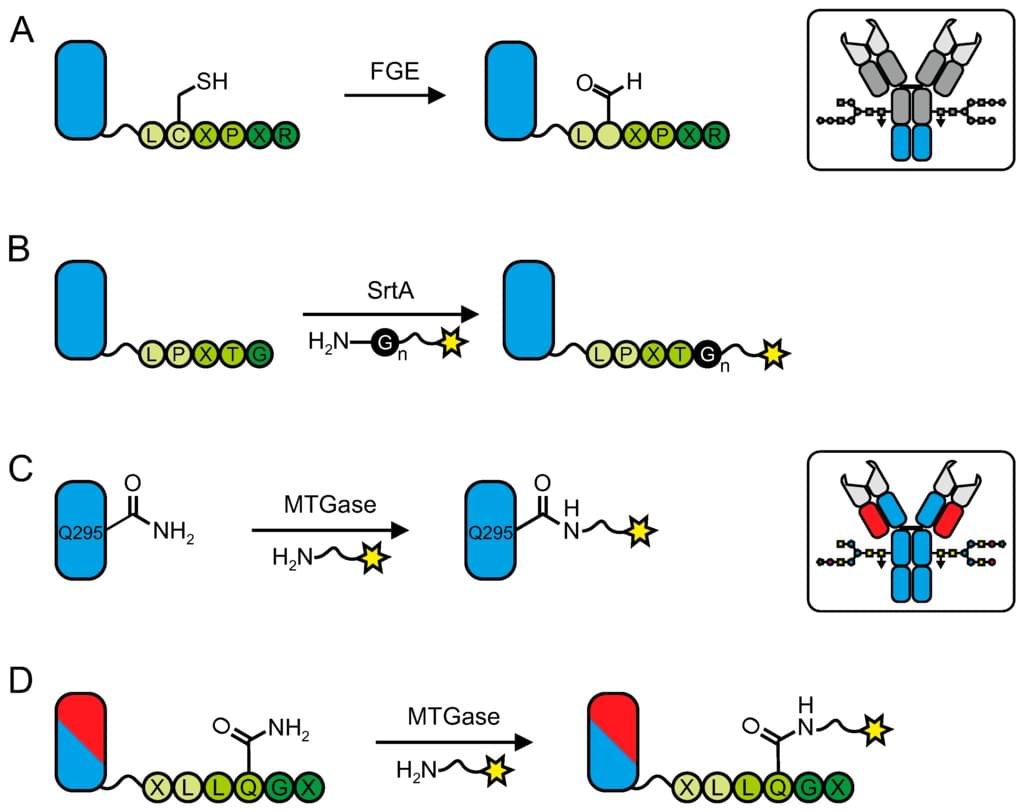Enzymatic Modified Antibody Design Service
Creative Biolabs provides unrivaled expertise in antibody-drug conjugate (ADC) production. Offering enzymatic modified antibodies for conjugation is one of our featured services. We have built up one-stop comprehensive antibody and pharmaceutical platforms to perform antibody engineering and conjugation.
 Fig.1 Enzyme-mediated modification and conjugation.1
Fig.1 Enzyme-mediated modification and conjugation.1
Enzymatic modified antibody can be used for site-specific conjugation. In this method, enzymes that recognize a specific amino acid tag are developed for site-specific antibody conjugation. Compared to conventional approaches, enzymatic conjugation permits more precise control over stoichiometry and conjugation sites which yields completely homogeneous conjugates. Generally, there are three strategies that are widely used for enzymatic modification of antibodies in bioconjugation. It is optional that using bacterial transglutaminase (BTGase/MTGase) from Streptomyces mobaraensis for enzymatic ligation. Transglutaminase can catalyze the cross-linking of lysine and glutamine containing peptides by forming an isopeptide bond. BTGase can catalyze the coupling of glutamine side chains to alkyl primary amines. BTGase is robust, Ca2+ dependent and has high reaction rate compared to mammalian TGases. It can be used to couple lysine-containing substrates or cadaverine derivatized entities to an antibody. Another strategy for enzymatic antibody modification is to use formylglycine generating enzyme (FGE), which recognizes a tag comprising a six-residue LCxPxR and oxidizes the cysteine to formylglycine, thereby creating a bioorthogonal aldehyde handle for site-specific chemical antibody conjugation.
As a global biotech company, Creative Biolabs can design and perform the most appropriate conjugation strategy to develop ADCs. Our professional teams with experts and years of experience in therapeutic agents manufacturing enable us to assist your researches about ADCs for scientific and clinical purposes.
There are various strategies used for antibody modification and conjugation:
- Cysteine-based conjugation
- Lysine-based conjugation
- Carbohydrate-based conjugation
- Unnatural amino acids-based conjugation
- Thio-engineered antibody
- Enzymatic modified antibody
- UV photocrosslinking(UV-NBS)
- Meditope-enabled antibodies
Reference
- Dennler, Patrick, Eliane Fischer, and Roger Schibli. "Antibody conjugates: from heterogeneous populations to defined reagents." Antibodies 4.3 (2015): 197-224. Distributed under Open Access license CC BY 4.0, without modification.
For research use only. Not intended for any clinical use.
This site is protected by reCAPTCHA and the Google Privacy Policy and Terms of Service apply.

